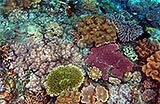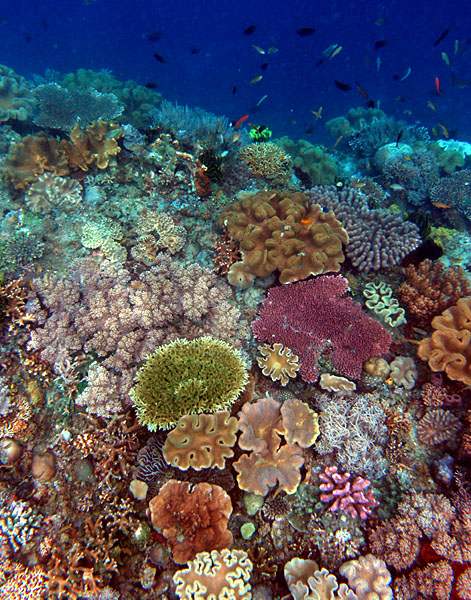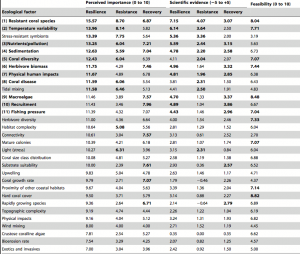Coral Reef Management in a Changing Climate
by Laurel Zaima, RJD Intern
Ecological disruptions have been occurring at an alarming rate and have been affecting many sensitive marine organisms. Fortunately, the coral reefs have been fairly resilient to the climate change; however, these disturbances have created a high demand for solutions to conserve the resilience of the coral reef. The scientists of the Prioritizing Key Resilience Indicators to Support Coral Reef Management in a Changing Climate conservation research paper conducted experiments in an Indonesian protected area to understand the coral reef’s level of resilience and the human power to help the coral’s resilience and recovery to the climate changes. The definition of resilience is “the capacity of an ecosystem to absorb recurrent disturbances or shocks and adapt to change while retaining essentially the same function and structure” (McClanahan et. al., 2). Resistance and recovery are the focus of the experiment because they are tangible aspects of resilience.
The picture (below) represents a healthy and flourishing coral reef off the north coast of East Timor. This coral reef is successful because it can withstand the environmental disturbances to the oceanic ecosystem.
In order to compare the impact of the ecological disturbances and the resilience of different coral reefs, the International Union for Conservation of Nature (IUCN) developed a “protocol for assessing coral reef resilience in this way to define management priorities,” but there are few criteria to support these the main urgencies. Therefore, researchers created new “resilience selection criteria” to accurately support the research priorities (McClanahan et. al., 3). Out of the top 13 factors for resilience, the researchers of this experiment only included 11 main factors that were considered the most practical and assessible for resilience management and conservation. Each of the 11 factors was given a 5-point scale value (0- none, 5- highest) to give the observations quantitative weight, and that data was averaged at each of the sites to provide a single resilience score. The collected data was compared to the IUCN’s 61-factor resilience assessment, also conducted in Indonesia. The gathered information represents a feasible approach to show the most effective coral resilience quality to endure climate change.
This data table shows the importance, scientific evidence, and feasibility of the resilient, resistant, and recovery measurements of 31 factors. The resilient scores are the sum of the resistance and recovery scores. Top 11 factors that this conservation research paper utilized is in bold.
The quantitative resilience ranking scores from the IUCN differ drastically from the resilience ranking scores from the 11-factor experiment. This deviating information signifies there are different ideas about which coral reef quality is the most resilient to climate change.
This research has affectively given scientists an idea of the most resilient coral reef qualities and a multitude of methods towards coral reef recovery. The central resistance factors are the “presence of stress-resistance coral species, which are less susceptible to thermally driven mortality; the presence of stress-resistance symbionts, which are less vulnerable to heat stress; and the presence of high annual temperature variability on a given reef, which can promote coral tolerance to anomalous temperatures” (McClanahan et. al., 3). Some of the necessary factors for coral reef recovery include “high levels of coral recruitment to replenish denuded locations; suitable substrate for coral settlement and survival; and low cover of macroalgae, which in high abundance can directly kill corals, trap sediment, prevent coral settlement, and dominate benthic space” (McClanahan et. al., 3). This conservation research paper allows scientists use this data and these ideas to help preserve the coral reefs from the changing climate.
REFERENCE
McClanahan, Tim R., Simon D. Donner, Jeffrey A. Maynard, M. Aaron MacNeil, Nicholas A.J. Graham, Joseph Maina, Andrew C. Baker, Jahson B. Alemu I., Maria Beger, Stuart J. Campbell, Emily S. Darling, C. Mark Eakin, Scott F. Heron, Stacy D. Jupiter, Carolyn J. Lundquist, Elizabeth McLeod, Peter J. Mumby, Michelle J. Paddack, Elizabeth R. Selig, and Robert Van Woesik. Prioritizing Key Resilience Indicators to Support Coral Reef Management in a Changing Climate. Tech. 8th ed. Vol. 7. N.p.: PLOS ONE, 2012.






Leave a Reply
Want to join the discussion?Feel free to contribute!